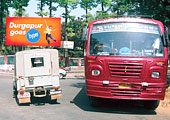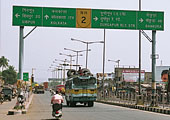MARCH 26, 2007
Durgapur, 179 km off Kolkata
It's a little after 8.00
a.m. as the Howrah-Ranchi Shatabdi Express chugs into Durgapur's
bustling railway station. As we (my colleague from BT Photo and
I) make our way out of the station, one of the first signs that
greets us is a mobile billboard screaming "Durgapur goes
hyper".
It's a little ironic because in the background stands the shell
of the almost defunct Burn Standard & Company, a one-time
blue chip-turned PSU. The area, billed as the "Ruhr of Bengal",
is now characterised by this economic duality. On the one hand,
you have the relics of the Nehruvian dream gone sour; and on the
other, visitors are surprised by the high rises, housing complexes,
malls, multiplexes, amusement parks, fine-dining restaurants and
star hotels that have come up over the last 4-5 years.
"This vibrancy can be attributed to the resurrection of
the iron and steel industry in the area," says Nirupam Sen,
West Bengal's Commerce & Industries Minister. In many ways,
it marks a return to its roots. The Durgapur-Asansol belt had
grown on the back of the success of the Durgapur Steel Plant (DSP),
the Alloy Steel Plant, some large psus like Burn Standard and
their ancillary industries, much like Jamshedpur has on the back
of Tata Steel. As the fortunes of these companies waned, so did
Durgapur's star. And the reluctance of the private sector to invest
in the state effectively hammered in the proverbial last nail
in its coffin. But that is now changing-and this time, it's the
private sector that's leading the way. But that is not to say
that the public sector is lagging behind.
DSP, a unit of Steel Authority of India (sail) and the town's
showpiece company, is now once again considered one of the stars
within sail; production, at 2.06 million tonnes per annum, is
at an all-time high; the target, at 2.92 million tonnes, is even
higher. As we alight from our rented car inside the plant, an
executive walks past, loudly reporting the previous day's production
figures over his cell phone, attracting a few bemused stares from
others in the crowd.
The company has also shed its fuddy-duddy psu style of functioning.
DSP recently leased out Kumarmangalam Park (a sprawling park within
the DSP Township) to a private group, which has turned it into
a modern amusement park. "Look at the turnout every day.
You cannot think of development without these," says a DSP
spokesman.
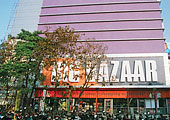 |
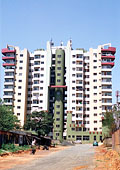 |
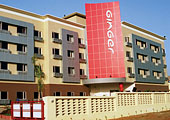 |
| Booming business:
Shopping malls, multi-storeyed
housing complexes and budget hotels are changing the face
of Durgapur |
It's now time to leave the DSP premises. On National Highway
2, we realise first hand why this belt was (and now once again
is) called the Ruhr of Bengal. As many as 30 iron and steel units,
albeit small and medium ones, have come up in the Durgapur-Asansol
belt since 2000 and all of them are riding the boom in the sector.
SPS-Elegant Steel, Jai Balaji Steel, Ma Chandi Durga Ispat, Shyam
Ferro Alloys, SRMB, Adhunik Ispat and Stallberg India are a few
of the names that this correspondent could quickly jot down. Statistics
available with Sen's ministry later tell us that investors have
funnelled more than Rs 1,100 crore (Rs 581.92 crore in industry
and over Rs 500 crore on infrastructure) in the Durgapur belt
over the last 3-4 years. But our driver, Suresh Singh, won't allow
us to stop here. "This is nothing. There are many more up
ahead. Won't you go there?" he asks. His enthusiasm is infectious;
so, we decide to go along. It's more of the same for miles and
miles. "Now let me show you around our 'city'," says
Singh, perhaps realising that driving past factory gates along
a National Highway isn't exciting us as much as he had hoped.
Our first port of call: the sprawling Durgapur City Centre,
a 370,000 sq ft plaza that plays host to leading brands like Van
Heusen, Arrow, Reebok, Woodland, Samsung, Nokia, Reliance WebWorld,
banks like HDFC, ICICI and UTI, a multiplex-Cinema 89-Big Bazaar
and a fine-dining restaurant. The Ginger, the budget hotel chain
run by Indian Hotels (which owns the Taj brand), is located close
by. "Occupancy levels are at 85 per cent-plus," says
Riaz Nizamuddin, the Manager of the hotel. Its only restaurant
does booming business, especially on weekends. So do the three
restaurants at Peerless Inn, next door. What's the typical profile
of patrons? "It ranges from executives to businessmen, to
doctors, lawyers and even students," says Nizamuddin. The
last category, though, prefers to hang out at the many malls-Suhatta,
City Plaza, Junction, to name a few-that now dot Durgapur's landscape.
Bidisha Sen, a teacher at the KidZee School, is palpably excited
about the new Reliance wholesale and retail trading centre that's
coming up in this neck of the woods. "Life seems much easier
and more comfortable now. From vegetables to spices to kitchen
appliances-they are all there under one roof. Besides, you get
a lot of freebies too," she adds.
Industry is upbeat, too. Says Prabhat Pani, CEO, Ginger Hotels:
"This belt is among the fastest growing regions in the country
because of its vibrant manufacturing and engineering industries."
Only, the private sector now leads where the public sector once
ruled. But that apart, the wheel of time has come a full circle
for this town.
|





